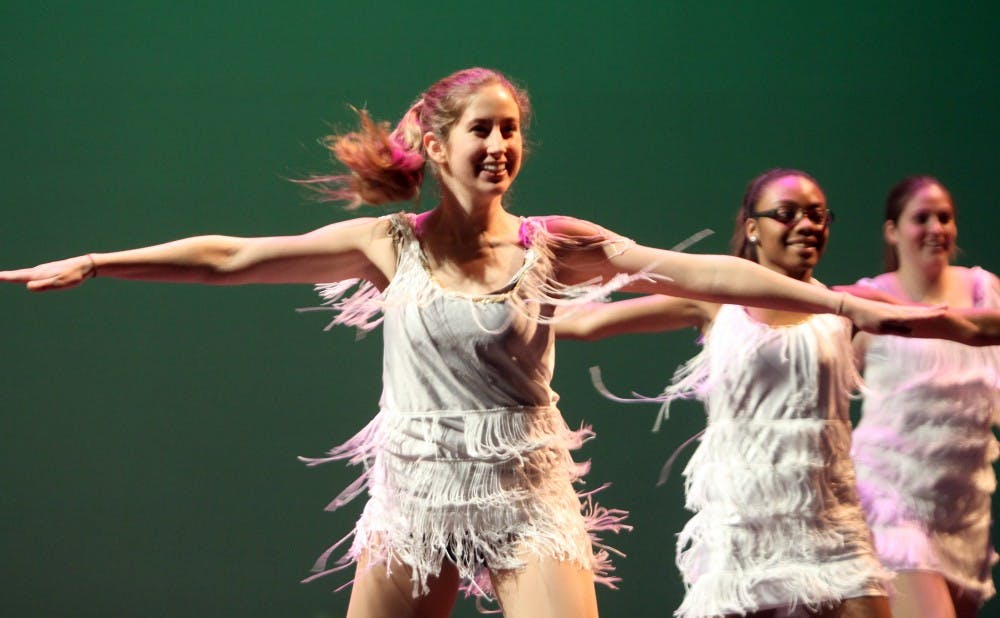This Friday and Saturday at 8 p.m. in the Reynolds Industries Theater, audience members will have the opportunity to see six individual creative visions all in one night.
ChoreoLab 2014 will provide the platform by which the community can enter into the minds and hearts of dancers and choreographers from Duke as they put on spring’s main stage dance performance.
The Duke dance program has worked to promote a diverse array of dance styles on campus, ranging from ballet to jazz to African techniques. ChoreoLab celebrates these myriad dance styles and makes it more accessible for dancers to generate and participate in quality choreography. In addition, students are offered the distinct opportunity to submit their original choreographies for adjudication by professors.
Junior Jennifer Margono, along with sophomore Maurice Dowell, choreographed and will perform one of these pieces. Their contemporary number is inspired by Plato’s dialogue in which he stated that humans, originally created with four arms, four legs and a head with two faces, were split apart and condemned to spend the rest of their lives in search of their other half. The piece draws on human elements, eliciting such universal sentiments as feeling alone in an experience and too lost to connect fully with someone.
“We really wanted to play with this idea that we were the same thing but split apart at some point,” Margono said. “The piece focuses on how our realities are parallel and we’re finding a way to search for someone that we’re able to relate to in the world.”
Margono continued to explain the process of choreographing a number, which has proved both rewarding and challenging.
“On the one hand, creating choreography is amazing because you get to create this organic movement that fits your own body,” Margono said. “But you are responsible for communicating your idea, and sometimes when you’re trying to choreograph your own piece, the image in your head might not always translate to the audience.”
The second student-choreographed number, by seniors Zsofia Salta and Bonnie DeLaune, is a ballet piece that follows a group of ballet dancers who, upon arriving at Duke, are exposed to new dance styles and vocabularies. The number explores and breaks away from traditional ballet movement in an effort to explore the myriad ways by which the body can move.
Along with the student numbers are four pieces choreographed by professors, with pieces that showcase dancers in ballet, modern, African and dance theater repertories.
Barbara Dickinson, professor of the practice of dance, chose to choreograph her piece to “Liquid Prisoner,” a work by Jennifer Fitzgerald, a graduate student who passed away in 2007, two years after completing her Ph.D. in music composition at Duke. Dickinson, noting Fitzgerald’s distinct and “wonderfully created” musical voice, decided she wanted to choreograph a work to celebrate Fitzgerald’s life. The music is contemporary classical, providing new challenges and stretching the limits of our conceptions of classical music. It flows directly into the second section of Dickinson’s choreography, which features a different track and provides a more direct remembrance of Fitzgerald. The stage will be left entirely bare, such that even the wings could be seen all the way to the back wall.
“I thought about what would happen if these beings only existed in this area—this stage—and if all of our emotions and thoughts and ideas and inspirations, everything that we expend as human beings, were somehow caught in that atmosphere, caught in that place within you,” Dickinson said. “Would that potency in human beings take on a life of its own?”
Get The Chronicle straight to your inbox
Sign up for our weekly newsletter. Cancel at any time.
Professor of the practice Ava Vinesett remarked on the support and intensity of her dancers, who represent a “diverse group of performers with an enormous range of abilities.” Her piece, “CuleBra II,” is an ensemble work that completely revises “CuleBra,” a 2001 work that was originally performed by 33 dancers.
“In ‘CuleBra II,’ 13 performers weave together music and dance from Afro-Cuban, Afro-Brazilian and Haitian Rada rites…emphasizing both the power of the drums and the dancer’s ability to communicate with the divine,” Vinesett said.
Thomas DeFrantz, professor of African and African American Studies, will also weave in a variety of elements for his work, “I Wish I Never Met You.” In this piece, DeFrantz incorporates the intersections of performance and technology with a “phase mirror.” This device, while still in development, was created by SLIPPAGE with professors Martin Brooke and Tyler Walters. DeFrantz will navigate these many media to examine the emotional space and leftover debris from a relationship gone bad.
“Sometimes we wish we never met people because the circumstance gets so hard to bear,” DeFrantz said. “But we have to find ways to persevere, and sometimes we find that through dance.”
Each individual involved in this production, to whatever capacity, emphasized the work and creativity necessary to create a refined and cohesive dance work to share with their audiences.
“People talk about choreographing and putting steps together,” Dickinson said. “It’s not just that. You have to use your physical knowledge, your intellectual knowledge, your sense of what you feel, to bring out of nothing a very structured, very integrated work that has a consistency and an internal logic but comes from a limitless possibility…It’s an investment of all parts of yourself.”
ChoreoLab 2014 will take place March 28 and 29 at 8 p.m. in the Reynolds Industries Theater. Admission is $15 with student pricing at $5. Tickets are available online or at the box office. For more information, visit the Duke dance program’s website.

